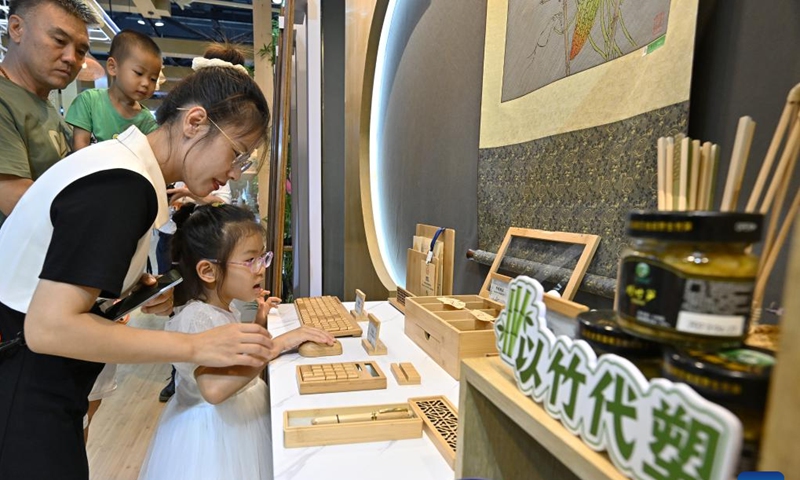China launches three-year plan for promoting bamboo as an eco-friendly substitute for plastics, according to the National Forestry and Grassland Administration

Visitors try mouse and keyboard made of bamboo at the environmental services exhibition of the 2023 China International Fair for Trade in Services (CIFTIS) in Beijing, capital of China, Sept. 2, 2023. Themed "Opening-up leads development, cooperation delivers the future," the 2023 CIFTIS is being held in Beijing from Sept. 2 to 6 and features over 200 varied events, including forums, negotiations, and summits. (Photo: Xinhua)
China has launched a three-year plan for promoting bamboo as eco-friendly substitute for plastics. The plan aims to build an industrial system to meet the goal, including the cultivation of bamboo, deep processing, and market expansion. The goal is to effectively enhance the capacity, and efficiency of replacing plastic with bamboo to help with the reduction of plastic pollution.
In the next three years, China will build five to ten application promotion bases for "replacing plastics with bamboos" in areas with abundant bamboo resources and a good foundation in the bamboo industry, the Global Times learned from the National Forestry and Grassland Administration (NFGA) on Tuesday.
These bases will carry out technological research and development, product standard formulation, and brand building to solidify the local development foundation for the scheme.
By 2025, a preliminary industrial system for "replacing plastic with bamboo" will be established, further improving product quality, variety, industry scale of the bamboo used. The comprehensive added value of main "bamboo instead of plastic" products will increase by more than 20 percent compared with 2022, and the comprehensive utilization rate of bamboo materials will increase by 20 percentage points by that time according to the NFGA.
Bamboo is a renewable green resource, which can be put into sustainable use once cultivated, Yin Gangqiang, deputy director of the International Bamboo and Rattan Organization said in a previous interview.
It grows fast, maturing in three to five years, has a low production cost and offers outstanding carbon sequestration capacity. It also has other ecological values such as water conservation, preventing water seepage and soil erosion as well as purifying the air, he added.
Bamboo not only grows fast and matures early, but it is also environmentally friendly and biodegradable, making it a viable alternative to plastic in at least 80 percent of fields.
China has abundant bamboo resources and enormous potential for industrial development.
There are 837 species of bamboo, covering an area of 7.56 million hectares, with total annual production of 150 million tons of bamboo materials. This industry is active in 20 provinces, with Fujian, Jiangxi, and Anhui, accounting for approximately 90 percent of the total bamboo resource area in the country, according to the NFGA.
Currently, there are over 10,000 bamboo processing enterprises, and the output value of the bamboo industry has increased from 82 billion yuan ($11.26 million) in 2010 to 415.3 billion yuan in 2022, with an average annual growth rate of over 30 percent. According to authorities, the total output value of China's bamboo industry will exceed one trillion yuan by 2035.
Global Times


